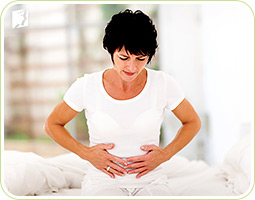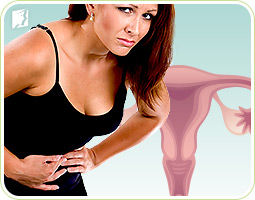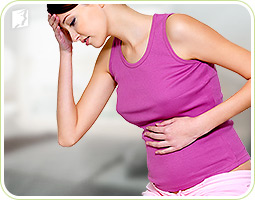
Painful periods are extremely common, especially during major life stages such as puberty or the time around menopause. Some studies estimate that as many as 75% of young women regularly suffer from painful periods.
Sometimes, a little stomach cramping is nothing to worry about and will pass either on its own or with some lifestyle changes. However, for some women the pain is so severe that they cannot attend to daily activities. Periods that cause extreme pain consistently can signify another medical condition and should be discussed with a doctor.
In all cases, there are many options for coping with painful periods, and each option's effectiveness will depend on the cause of the pain. That is why it is important to understand the different causes of painful periods and the treatments available.
Continue reading to learn more about painful periods, what are the causes, and how to treat them.
About Painful Periods
Menstrual pain usually only occurs either just before or during the first day of bleeding. The pain is usually a dull or throbbing ache in the abdomen, but can also occur in the thighs or lower back. It usually lasts for 12-24 hours. It often occurs with premenstrual syndrome, which includes a variety of emotional and physical symptoms.
For some women, the pain is simply annoying and passes on its own. For others, it can cause significant discomfort and interferes with daily life. This condition is called painful periods, medically known as dysmenorrhea. It is estimated that 1 in 5 women experience painful periods, and it is most common in women who are nearly to puberty or menopause. In addition, painful periods symptoms may also include nausea, vomiting, diarrhea, and dizziness.
Painful periods may also signify a different medical condition. That is why it is important to talk with a doctor if you are experiencing severe pain around the time your period begins. It can also be helpful to understand the different reasons that cause them. Continue reading to learn more about the causes of painful periods.
Painful Periods Causes

The pain is caused by small contractions in the walls of the uterus. The uterus contracts to push out the extra lining of the walls of it, which come out in a normal menstrual bleeding. As the walls of the uterus contract, they squeeze and cut off the blood supply to the uterus; when the blood supply is cut off, the body releases chemicals that make you feel pain. At the same time, the body releases hormones called prostaglandins, which cause the uterus to contract more and worsen the pain. Some women have more prostaglandins than others, which may be why they experience more menstrual pain.
Painful periods may signify a hormonal imbalance or change, particularly during the years of puberty and the transition into menopause. As the body releases different levels of hormones, the rest of the reproductive organs affect the menstrual cycle, for example increasing pain during menstruation.
There is also a possibility that one of the following medical conditions could be the cause:
- Endometriosis. In this condition, the cells that make up the lining of the uterus start to grow in the fallopian tubes and around the ovaries.
- Uterine fibroids. This condition occurs when benign tumors grow in the uterus.
- Adenomyosis. In this condition, the cells that normally line the uterus start to grow into deeper into muscle that makes up the walls of the uterus.
- Pelvic inflammatory disease. This condition occurs when the uterus and fallopian tubes become infected with bacteria. The bacteria usually arrive through sexual contact with another infected individual.
- Cervical stenosis. In this condition, the opening of the uterus, called the cervix, is too small to allow menstrual blood to pass through. Menstrual blood builds up in the uterus causing pressure.
- Intrauterine device (IUD). An intrauterine device is a small object that is placed in the uterus and works as a long-term contraceptive device.It can sometimes cause menstrual pain as a side-effect, especially in the first few months after it is inserted.
In any case, seeing a doctor can be useful in determining the real cause of painful periods and if them can impacts fertility. Continue reading to learn more about how painful periods may affect fertility.
Painful Periods and Fertility
In most cases, painful periods do not affect fertility. It is a normal part of the menstrual cycle and just means that the uterus is contracting as it should.

If the pain is severe, then it can be important to identify if there is a related medical condition because some of the conditions listed above can affect fertility. For example, both endometriosis and pelvic inflammatory disease can make it difficult to conceive. Fortunately, treating these conditions early can usually alleviate fertility problems. For this reason, it is important to monitor your reproductive health and see a doctor if any irregularities arise.
If there is no underlying condition, then there is a variety of ways to treat painful periods. Continue reading to learn more about treating painful periods.
Painful Periods Treatments
Treating painful periods in the absence of an underlying condition can involve different approaches that range from minor lifestyle adjustments to more invasive options like surgery.

Lifestyle changes are the easiest to implement and include no side-effects. If the pain is related to hormonal levels, then a few simple lifestyle changes, combined with alternative remedies to restore hormonal balance are normally the most effective steps to take.
In addition, for more serious incidences, there are ways to use medication to treat painful periods, such as anti-inflammatory drugs and hormonal birth control pills.
If none of the above methods prove effective, then surgery can be a final option, particularly if you have been diagnosed with endometriosis or uterine fibroids. Click on the following link to learn about the treatments for late and missed periods.
Sources
- Gupta HP, Singh U, Sinha S (2007). "Laevonorgestrel intra-uterine system--a revolutionary intra-uterine device". J Indian Med Assoc 105 (7): 380, 382-5.
- Loose, Davis S.; Stancel, George M. (2006). "Estrogens and Progestins". In Brunton, Laurence L.; Lazo, John S.; Parker, Keith L. (eds.). Goodman & Gilman's The Pharmacological Basis of Therapeutics (11th ed.). New York: McGraw-Hill. pp. 1541-1571.
- Morrow C, et al. Dysmenorrhea. Primary Care Clinics in Office Practice. 2009;36:19.
- Smith RP, et al. Treatment of primary dysmenorrhea in adult women. http://www.uptodate.com/home/index.html. Accessed June 24, 2012.
